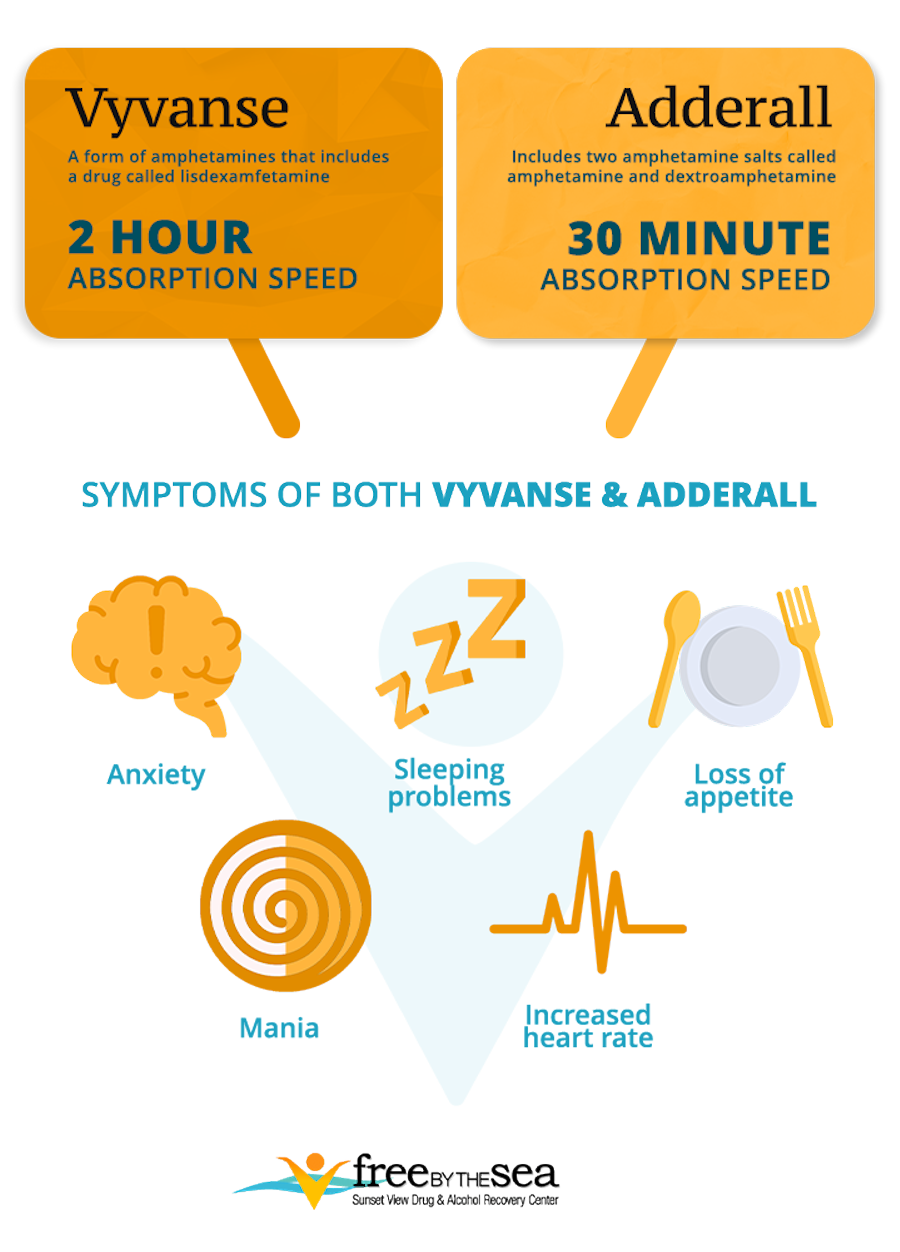Vyvanse vs Adderall: What’s the Difference?
Jump to Section
When it comes to ADHD medications, Vyvanse and Adderall are two of the most commonly prescribed options, but they function in different ways. The key difference between Vyvanse and Adderall is how they work: Vyvanse remains inactive until the body metabolizes it, taking effect within 1 hour and lasting 8-14 hours. Adderall, acts faster, with IR peaking within 3 hours and XR lasting up to 12 hours.
In this article, we’ll explore these differences in more detail, including their benefits, side effects, and how to choose the right medication for your needs.
Adderall was approved for use in 1996 and Vyvanse was approved for use in 2007. However, Vyvanse is not approved for use by children under 6. Additionally, Adderall can be used to assist those suffering from narcolepsy whereas Vyvanse has been cleared for treating binge eating disorders in adults 18 years or older.
Both drugs have a Schedule II classification placed on them according to DEA regulations. Drugs listed with this categorization mean that they are at the highest level of control that can be prescribed by a doctor. This categorization reflects their high potential risk of physical dependency and the possibility of addiction if misused. Both Adderall and Vyvanse are known to work as prescribed when under the guidance of a medical professional. When they are taken off-label or without a prescription medication, people engage in substance abuse and could become addicted.
Both drugs are forms of amphetamines, but the difference is Adderall includes two amphetamine salts called amphetamine sulfate and dextroamphetamine sulfate. Vyvanse includes a drug called lisdexamfetamine which turns an individual’s body into dextroamphetamine before it can be used.
While these substances are both very similar, they do have some differences. If you or a loved one is suffering from attention deficit hyperactivity disorder or any of the medical conditions that utilize Vyvanse or Adderall as a medication treatment method, you should discuss these differences with your doctor. Only your physician can determine which medication is ultimately best for you.
Dosage Amounts and Types
Adderall IR (tablet form) and Adderall XR (capsule form) come in six different dosages that range from 5mg to 30mg. Vyvanse is available in capsules and chewable tablets and dosages come in an even larger range, spanning from 10 to 70 mg.
Everyone responds differently to medications that’s why doctors typically start with lower doses when first prescribing these drugs so they can slowly adjust the dosage until it meets your specific needs.
The Cost of the Medication
A month’s supply without insurance can cost anywhere from $150 to $400 depending on specifics like frequencies and doses. Adderall IR costs around $11, $25 for Adderall XR and Vyvanse cost around $19.
Fortunately for those watching their wallets, generic versions of Adderall IR and Adderall XR known as ‘mixed amphetamine salts’ offer a considerably cheaper alternative. However, not all individuals find them equally effective compared to brand-name drugs.
Meanwhile, for individuals prescribed Vyvanse, it’s unavailable in its generic form. This is because Vyvanse has only been approved by the FDA as of 2007. Online pharmacies might market some medications as “Vyvanse alternatives,” but be aware that these forms lack official approval potentially making them unsafe options. Ultimately it falls upon each individual and their doctor considering ADHD medication to consider factors such as price before determining what drug best suits their needs.
The Speed of Absorption
One of the key differences between Adderall and Vyvanse is the rate of absorption. While Adderall takes effect within 30 minutes, it can take up to two hours for the effects of Vyvanse to be felt because it’s a prodrug.
A prodrug is a type of medication that must go through metabolic processes for it to become active. People have reported that taking this drug produces more subtle results than Adderall. This is because its slower rate does not produce an immediate snap of energy when ingested, many find the experience smoother.
Medication (Symptoms) Rebound
Medication rebound is a term used to describe the return of pre-treatment symptoms, or the worsening of those symptoms when an individual stops taking their medication. Vyvanse offers a smoother transition when the medication’s effects start to diminish, while Adderall allows for more flexibility in use. Adderall offers extended-release capsules and intermediate-release tablets, you have the choice of taking it daily or on an as-needed basis. This can be especially beneficial if wanting your meds to wear off before bedtime.
However, both Adderall and Vyvanse have been known to cause medication rebound symptoms if taken for extended periods without a proper prescription. This is yet another reason you should only use this medication under the supervision of a doctor.
Overall Safety in Use
Vyvanse only works if it’s processed by the body giving it an extra safety advantage. It cannot be broken down to be inhaled or injected. Adderall still has this capability.
Vyvanse and Adderall are both potent, Schedule II drugs, meaning they have the potential to be misused. To avoid any potential negative side effects both should be taken orally as directed by a physician. To ensure your medications aren’t being abused, always store them securely and out of reach from others.
Side Effects of Adderall and Vyvanse

The side effects of both Adderall and Vyvanse include:
- Nausea
- Vomiting
- Stomach pain or stomach cramps
- Diarrhea
- Dizziness
- Dry mouth
- Headache
- Loss of appetite and weight loss
- Difficulties with sleep
- Irritability
- Anxiety
- Increased heart rate
- Increased blood pressure
- Shortness of breath
- Hallucinations
- Suspiciousness or paranoia
- Mania
If you suffer from a heart condition, stimulant drugs can be detrimental to your health. We can assist those struggling with stimulant addiction, as well as connect individuals to depressants addiction treatment when needed. Those individuals who suffer from psychiatric disorders or seizures should avoid taking such medications as they could aggravate their already existing symptoms and cause blurred vision. Additionally, Vyvanse poses special additional risks for affecting sleep patterns because it’s more effective for longer.
Vyvanse vs Adderall: Drug Interactions and Risks
Adderall and Vyvanse can both interact with certain other medications or chemicals, including acidifying agents, alkalinizing agents, monoamine oxidase inhibitors (MAOIs), and opioids.
Monoamine oxidase inhibitors (MAOIs) are commonly referred to as antidepressants. When mixing antidepressants with Vyvanse or Adderall the combination can cause someone’s blood pressure to rise to dangerous levels. Mixing stimulant medications with an opioid can create physiological and mental complications, including addiction.
Acidifying agents (like ascorbic acid or fruit juices) can lower the amount of drug that the body absorbs while alkalinizing agents (like baking soda) can increase absorption.
Do Adderall and Vyvanse Cause the Same Results?
Adderall and Vyvanse are effective medicines for treating ADHD. While they come from the same family of drugs (amphetamines), there is a significant difference between them. Adderall contains amphetamine salts directly while Vyvanse uses lisdexamfetamine as a “prodrug,” which gets converted into an active form in the body before it has any effects. This extra step makes its side effects less pronounced than those taking Adderall.
Both medications can still cause anxiety, sleeplessness, and digestive issues along with some other problems. It’s important to remember that these are powerful substances that can have very serious addictive properties if used improperly or without medical supervision.
Is Adderall or Vyvanse More Effective?
Adderall and Vyvanse have both been clinically shown to provide relief from disruptive symptoms associated with Attention Deficit Hyperactivity Disorder (ADHD). According to multiple studies in the Journal of Attention Disorders, Clinical Drug Investigation, and JAMA Psychiatry, Adderall was found significantly effective for problems such as attention issues, hyperactive behavior, impulsivity issues & aggression.
In a separate study published by Clinical Drug Investigations that compared Vyvanse against a placebo, both children and adults reported significant relief in treating ADHD symptoms when taking it. When comparing how well these medications worked at preventing relapse of binge-eating disorder, only 3.7% of those using Vyvanse had a relapse – which is much lower than 32.1% who used placebos.
It’s important to note, that medication works differently for each person so be sure you talk over all your options with your doctor before making any decisions regarding prescription medications.
Will My Doctor Likely Prescribe Vyvanse or Adderall for Me?
The decision of whether to prescribe Adderall or Vyvanse to treat ADHD is based on the physician’s knowledge of the patient and the specific symptoms the physician is attempting to address. Side effect profiles of drugs are also often considered by physicians before making a choice on which medications are going to be prescribed to a patient.
In rare cases, there is a potential risk for heart attack or stroke with any type of stimulant medication. Physicians would consider the patient’s history and specific vulnerabilities before deciding which medication would be most appropriate.
Both medications have similar interactions with other substances, so physicians typically review that list to determine which medication would be less likely to produce negative interactions.
Can I Drink Alcohol While Taking Vyvanse or Adderall?
No, it would be best if you did not mix alcohol while taking Vyvanse or Adderall. Mixing alcohol with Adderall or Vyvanse can be a dangerous combination. Adderall may increase your heart rate and blood pressure to an unsafe level, potentially leading to stroke or other cardiac events. Alcohol mixed with Vyvanse can reduce the stimulant effects of medication while still causing intoxication. This can greatly increase the user’s risk for overdose.
Further risks include changes in blood pressure, increased heart rate, chest pains, seizures, and even hallucinations. Additionally, drinking alcohol while taking ADHD medications can increase the likelihood of developing negative symptoms related to the condition. Free by the Sea offers treatment for alcohol addiction, including a detoxification program, for those struggling in Ocean Park, Washington.
Is Vyvanse and Adderall Addictive?

Many people misuse prescription drugs in an attempt to become more focused and alert whether it be for school, work, or other obligations. Unfortunately, this often leads to addiction as a result of taking the medication when not prescribed or taking more than prescribed. Quitting Vyvanse or Adderall abruptly after engaging in substance abuse can trigger drug withdrawal symptoms that may require professional help.
Find Recovery from Vyvanse or Adderall Addiction at Free by the Sea!
If you’re struggling with addiction to Vyvanse or Adderall, help is here! Free by the Sea’s addiction treatment specialists offer a wide range of proven therapies for anyone seeking sobriety. Our team will develop an individualized plan tailored specifically to your needs.
We offer group therapy meetings and a variety of specific treatment programs that can fit your unique situation. At Free by the Sea, we offer inpatient treatment programs and outpatient treatment programs. Contact us today to learn more about Free by the Sea!

Dr. Richard Crabbe joined our team in 2019 as our psychiatrist and medical director. He attended the University of Ghana Medical School where he became a Medical Doctor in 1977. From 1978 through 1984, he was a medical officer in the Ghana Navy and provided a variety of services from general medicine to surgeries. He received his Certificate in General Psychology from the American Board of Psychology and Neurology in 2002.

 August 28th, 2024
August 28th, 2024











